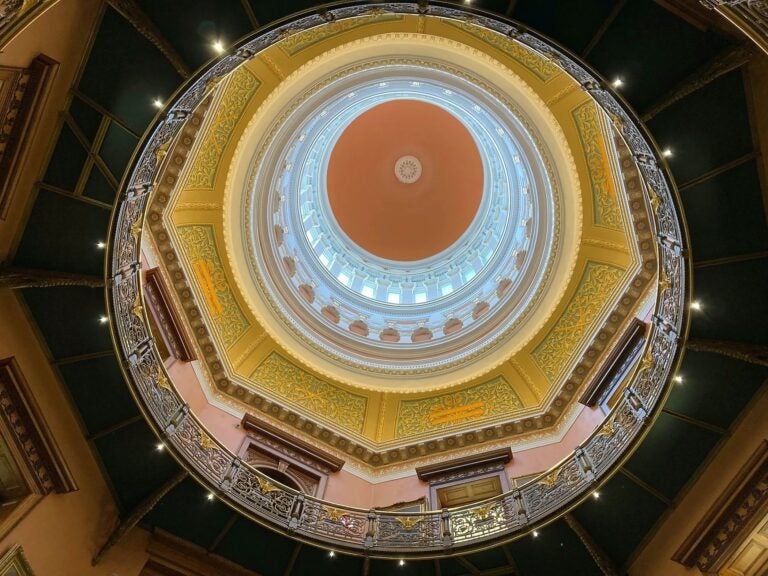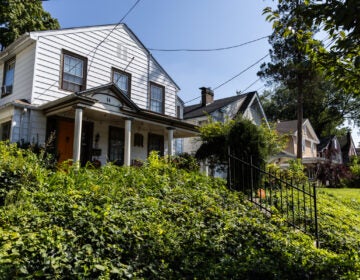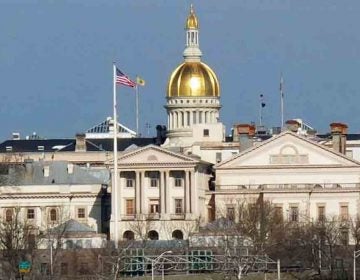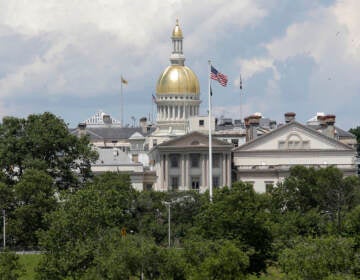N.J. Gov. Phil Murphy signs $58.8B budget with tax hikes and a surplus boost
New Jersey’s new state budget includes property tax relief, new taxes on cigarettes and gambling and billions for the surplus fund.
Listen 1:08
File - The rotunda at New Jersey's State House. (AP Photo/Mike Catalini)
From Camden and Cherry Hill to Trenton and the Jersey Shore, what about life in New Jersey do you want WHYY News to cover? Let us know.
With only a few minutes to go before the deadline, New Jersey Gov. Phil Murphy approved a $58.8 billion budget for the state for fiscal year 2026. This year’s spending plan is the largest in state history, almost 4% higher than last year’s budget.
The state constitution requires that a budget for the new fiscal year be approved by lawmakers and signed by the governor no later than 11:59 p.m. on June 30 — otherwise the state officially shuts down.
It is unclear why the governor’s office waited until after midnight to announce Murphy had signed the budget legislation. Murphy’s office could not be reached for comment.
The spending plan is $727 million more than the governor originally proposed in his budget address this past winter.
What relief will New Jersey’s 2026 budget provide for residents?
The budget bill, which was passed by the state Senate on Monday afternoon and approved along party lines by the General Assembly a few hours later, preserves the ANCHOR property tax program, which provides relief to homeowners and renters. Many older homeowners are eligible to receive up to $1,750 while older renters can qualify for up to $700.
The budget also funds the state’s Senior Freeze program, which reimburses older residents for rising property taxes or mobile home park site fees on their homes. Lawmakers approved $280 million for Stay NJ, a program that calls for property taxes for homeowners 65 and older to be cut by 50% starting next year. The maximum cut for the program is projected to be $6,500 for those earning less than $500,000.
Here’s where New Jersey’s residents will experience a tax hike
Cigarette smokers will pay 30 cents more per pack, and the tax on vaping cartridges will go up 20 cents.
There will also be an increase in taxes for in-person casinos and online gambling and sports betting.
The state’s real estate transfer fee will rise from 1% to 2% on properties that sell for $2–$2.5 million, and 3% for homes that sell for $2.5–$3.5 million.
Saving for a rainy day
The fiscal year 2026 spending plan contains a $6.7 billion surplus. The money could quickly evaporate if proposed cuts to federal programs, including Medicaid, take place. New Jersey received more than $22 billion in federal funds in fiscal year 2024.
The budget also includes a full $7.2 billion pension payment, increased funding for school aid and more money for mass transit.
Lots of criticism
The new budget, which contains an estimated $500 million in add-on spending for a variety of programs in legislative districts controlled by Democrats, has been strongly criticized by Republican officials.
John DiMaio, Assembly minority leader, said the state is facing an affordability crisis and accused Democrats of spending “like drunken sailors.”
State Sen. Parker Space described the new budget as “reckless” and said it is “stuffed with pork” and will hurt average residents.
The spending plan was also criticized by members of Gov. Murphy’s own cabinet. State Attorney General Matt Platkin expressed “great disappointment” about $45 million in opioid settlement funding being diverted to four hospitals in the budget.
That money was collected by New Jersey and other states from pharmaceutical companies that manufactured opioid painkillers.
“My office fought for years against companies who profited off the deaths and addiction of thousands upon thousands of New Jerseyans,” Platkin said in a statement. “When we announced these settlements, I stood with Governor Murphy and promised these settlement dollars would go towards evidence-based solutions to help those struggling with opioid addiction — not to pad the State’s coffers.”
New Jersey Acting Comptroller Kevin Walsh also criticized the late inclusion of language in the budget that seemed to be designed to block the state’s Department of Human Services from limiting funding to Jersey nursing homes that get poor marks on inspections.
Republicans also voiced anger about the budget approval process and the lack of time lawmakers had to review the more-than-300-page document. Committees in both the Senate and Assembly approved the budget bill late Friday evening.
The Democratically controlled legislature then approved the spending plan on Monday, along with 139 other bills. The session took several hours, and while lawmakers had an opportunity to speak about different elements of the budget, the entire process was rushed, without an opportunity for dialogue and discussion, critics said.
Micah Rasmussen, director of the Rebovich Institute for New Jersey Politics at Rider University, said pushback of the budget process was well placed, because the details of the budget were not made public until the last minute.
“People are right to be concerned,” he said. “You could not actually see what was in the budget, it wasn’t something that reporters could report on, and if you can’t see what’s in the budget you can’t respond to it, you can’t let your lawmakers know what you like about it, what you don’t like about it, how it’s going to affect your life.”
He said if lawmakers wanted to change the budget process and allow more time for detailed analysis and discussion, they could do so.
“There is not a will to do that,” he said. “They don’t focus on it until it’s too late in the process, and what that means is we wind up without a meaningful way to have public participation.”
State Sen. Tony Bucco said the current budget process is not working.
“This rushed, opaque budget charade is exactly why New Jersey is in the fiscal mess it’s in,” he said. “There’s no accountability, no long-term planning and absolutely no transparency, just last-minute deals and political favors pushed through at night while taxpayers are asleep.”
He said Democrats ignored members of the GOP on budget-related issues and discussions.
“Giving Republicans a seat at the table isn’t a political courtesy, it’s a benefit to all New Jerseyans,” he said. “At this point the wheels of state government aren’t just coming off the bus, they’ve been shooting sparks off of the chassis.”
Rasmussen said the same type of secret, last-second budget negotiation process has taken place historically no matter which political party controlled the legislature, but that the lack of transparency seems to have gotten worse in recent years.
He said having little time to review the budget “is nothing new, but the idea that there would not be a budget document to even look at, to evaluate, that is new and that is an abuse.”
“We don’t really get our government to focus on things until it’s a crisis,” he said. “It is not limited to this budget, it is not limited to this year, government doesn’t tend to focus on things until there is no choice, until there is no time left on the clock, and then you can’t expect a deliberative process to unfold.”

Get daily updates from WHYY News!
WHYY is your source for fact-based, in-depth journalism and information. As a nonprofit organization, we rely on financial support from readers like you. Please give today.







